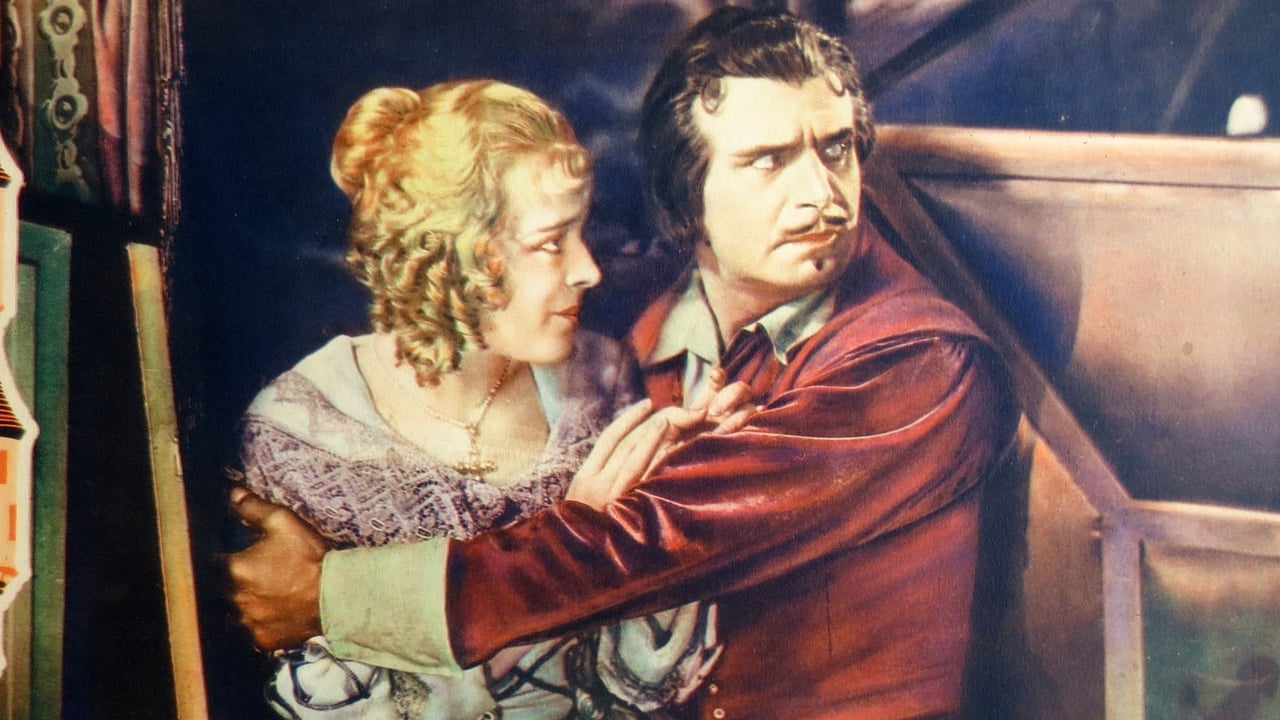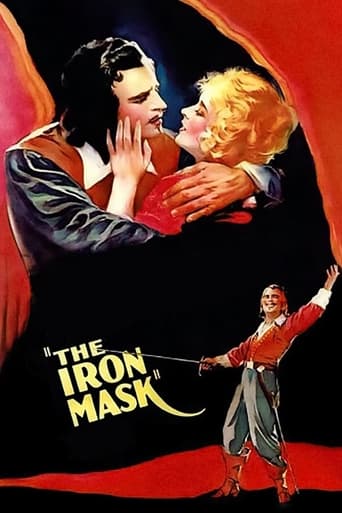



It's a mild crowd pleaser for people who are exhausted by blockbusters.
View MoreStrong acting helps the film overcome an uncertain premise and create characters that hold our attention absolutely.
View MoreThe acting in this movie is really good.
Great movie. Not sure what people expected but I found it highly entertaining.
View MoreOne of the best versions of The Man in the Iron Mask and one of Douglas Fairbanks' best films too. Details-wise, The Iron Mask might deviate from the book but the spirit of the story still remains, and in a much better way than most of the versions that followed it. It does feel rushed at times, and William Bakewell does do much better as the good twin than the evil twin, as the good twin he is sincere but as the evil twin he does over-egg the pudding too much. The sets and costumes are beautiful with the attention to detail authentic, while the photography is equally effective like the shadowy effects in the prison scenes that are most atmospheric. Carl Davis' score fits the action very well and sounds sweeping in an appropriate way. The film is written in a snappy way, the story is as fun, energetic, exciting and tense as the story of The Man in the Iron Mask is, the ending is genuinely moving(and not just mildly, this is emotional stuff) and the action is rousing and leaves you at the edge of your seat biting your nails and cheering for the heroes. Douglas Fairbanks is an as ever lively presence, with stunts and athletic moves that are the envy of anybody regardless of their age, but brings also pathos to his performance as well. In support, everybody is very good but Nigel De Brulier is broadly venomous, Margarite De LaMotte will leave you really identifying with Constance and rooting for her and Ulrich Haupt is a sinister Rochefort but with somewhat a charm of his own. All in all, well worth looking out for, Fairbanks' touted farewell to silent swash-bucklers is an excellent film. 9/10 Bethany Cox
View MoreMonday August 28, 7:00pm, The Paramount TheaterDumas amuck Among the most popular works of literature adapted for film, Alexander Dumas' D'Artagnan Romances, have seen no less than ninety versions produced for the screen, from Biograph's abbreviated, Fencing Contest from 'The Three Musketeers' (1898), to French and Latvian features released in 2005. Dumas' trilogy, The Three Musketeers, Twenty Years After, and The Vicomte de Bragelonne, have been reincarnated as animated characters, French Legionnaires, secret agents, troubadours and even Texas Rangers!A Modern Musketeer ...D'Artagnan was perfect casting for an excessively energetic Douglas Fairbanks in A Modern Musketeer (1917). The film offered a glimpse of the young swordsman as a fantasy sequence within a modern story. It also served as a seed of inspiration when Fairbanks launched into the final decade of his silent film career with a series of costume dramas including The Three Musketeers (1921). The art direction, production design and originality of these films, which include Robin Hood (1923), The Thief of Bagdad (1924) and The Gaucho (1928) remains unsurpassed today. As his finale to the silent era, Fairbanks returned to Dumas and D'Artagnan's further adventures in The Iron Mask (1929). Along with Fairbanks, returning from the 1921 film were Marguerite De La Motte as Constance, Nigel De Brulier as Cardinal Richelieu (a character he played four times), Lon Poff as Father Joseph, Charles Stevens as Planchet, D'Artagnan's servant, Leon Bary as Athos and screenwriter Lotta Woods. Fairbanks also gave a nod to the coming of sound by including a Vitaphone sound-on-disk synchronized musical score which included a spoken prologue and bridge between the end of the Musketeers and Twenty Years After. In 1929, the film was released with both sound and silent versions, as was often the case."It is sometimes more difficult for Kings to return Than to make an exit."This was the last and final time Fairbanks would buckle his swash and the culmination of a lifetime playing humorous and high-spirited action heroes. For it's sheer brilliance of concept, its fluid movement from one scene to the next with the continuous flow of narrative, the initial introduction of characters and setup of the story in this film is unequaled. The film begins with the entrance of King Louis XIII at St. Germain as he anxiously awaits the birth of an heir. The quality of set design, thousands of costumed extras used, monumental production scale and painstaking detail of craftsmanship could never be undertaken today. From the palace, the action moves to D'Artagnan beckoning Constance from the street, below her window. She must hurry to the waiting Queen's coach, and in a sequence of almost balletic beauty she and D'Artagnan hurry from place to place, in search of a moment's privacy, and a kiss. At forty-five, Fairbanks shows every bit of the athletic grace seen in earlier films as he and De La Motte glide over a garden wall and back again. Fairbanks gives his character just the right amount of boyish mischief to balance a flawless performance. D'Artagnon literally rides into the next scene as he jumps from the coach to the aid of his fellow musketeers. They challenge the Cardinal's Guards, then seamlessly move into a wonderful display of humorous camaraderie as the four link arms in a tug-of-war between the much larger Porthos (Stanley J. Stanford) and D'Artagnan that ends as they pull a cartload of barrels into a tavern. Only Fairbanks could transform something as simple as catching a tossed breadroll into a captivating display of skill. The Musketeers are left to pass the time as the action returns to the palace and Louis presenting his newborn son to the cheering sea of humanity below (and that ain't cgi!). And then of course, there is " the other one " As in all Fairbanks' films, the swordplay is spectacular, this time using Belgian fencing master Fred Cavens as coach and consultant. Overall production was supervised by Maurice Leloir, " the acknowledged authority on the period depicted. With The Iron Mask , Fairbanks offers a combination of action, romance and humor showcasing the skills that he developed over years as he literally defined the genre. It's hard to imagine having a better time at any movie.
View MoreThis is an entertaining version of the legend, familiar from the Dumas novels and numerous movies, of the Musketeers and "The Iron Mask". D'Artagnan is a very good role for Douglas Fairbanks, and as always he makes his character human, likable, and energetic. The story-telling is straightforward, but it has plenty of action and moves at a good pace. The version that has the added narration by Douglas Fairbanks, Jr. also works well. The narrative is well-written and lively, and nicely complements the action on-screen.The old-fashioned style of filming works pretty well for this kind of story, Fairbanks is in his element, and he gets good support from the rest of the cast as well. This is a fun feature for anyone who likes silent films.
View MoreIn Kevin Brownlow and David Gill's extraordinary 1980 documentary about the silent era "Hollywood" the final sequence of "The Iron Mask" is described as Fairbanks' farewell to the silent film. And it is.Generally this is an inferior film to the amazing 1921 "Three Musketeers". Allan Dwan is not the visual stylist that Fred Niblo is, and so "The Iron Mask" becomes much more of a straightforward action film. But as such it is splendid. I think we tend to forget what a good actor Fairbanks was. His emotional journey here is quite powerful as he faces the death of his lady and of his friends - and he ages convincingly as well.Most of the cast is different to the "Three Musketeers" but Margueritte de la Motte returns as Constance and the unforgettable Nigel de Brulier again plays Richilieu with extreme venom.Fairbanks has an athletic field day as well. There seem to be a number of versions of this film around. The one I saw ran 95 minutes and had tinted sequences. I've seen some advertised as having talking sequences, and others with narration by Douglas Fairbanks Jr - the one i saw had neither of these.It was probably the last large scale silent feature made in Hollywood. And that is what gives those gorgeous last minutes such power. The silent era was truly the golden years of Hollywood and Fairbanks was its king - in this film he sadly abdicates.
View More